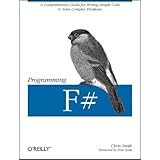
Average Reviews:

(More customer reviews)Are you looking to buy Programming F#: A comprehensive guide for writing simple code to solve complex problems (Animal Guide)? Here is the right place to find the great deals. we can offer discounts of up to 90% on Programming F#: A comprehensive guide for writing simple code to solve complex problems (Animal Guide). Check out the link below:
>> Click Here to See Compare Prices and Get the Best Offers
Programming F#: A comprehensive guide for writing simple code to solve complex problems (Animal Guide) ReviewAs of Nov 2009, this is probably the easiest book out there on F#. Chris Smith doesn't approach the book assuming prior functional programming knowledge. He avoids getting overly complicated or using difficult terms. There was no point in the book where my eyes glossed over because it got too hard to follow.The book is split into two parts. The first part is a mainly a run through all of the F# syntax, getting you setup and writing F# code quite quickly. Even though I've been using F# for a couple of years, I still picked up a few new things. It's a book you can use as a reference for parts of the language, even though the actual product documentation is coming together. Of note is the section on lists, which I found particularly clear and easy to follow.
The second part of the book is where Mr. Smith takes it up a notch. The book says it's "applied" F# programming, which in many programming books means the author is about to go over some common APIs for you. Not so in this book. The second part shows some of the very powerful and practical things you can do with F#. The introduction to workflows (computation expressions) was excellent; I don't believe I've seen an easier-to-understand explanation for those who haven't dealt with such constructs before (and there's no use of the dreaded word "monad"!).
What really surprised me was that this book follows up on workflows with a great section on quotations. Not only does it give an overview of what they are, but it provides enough depth so that you can actually start processing and manipulating quotations right away.
Even the appendix is worth reading, as there's a part on F# interop. While F# runs on the CLR, there are certain constructs in F# that won't necessarily look pretty in C#. The appendix goes over how to avoid those problems and make clean ".NET-friendly" APIs.
Overall, I'm quite content with the book. It's a good purchase, even for an experienced F# user. If you're trying to learn F#, and don't have a functional background, this is the book to start with.
As a note, the content doesn't overlap excessively with "Functional Programming for the Real World". So if you're considering both, you won't be disappointed. They're actually so complementary, I'm not sure which one is better if you can only get one.Programming F#: A comprehensive guide for writing simple code to solve complex problems (Animal Guide) Overview
Want to learn more information about Programming F#: A comprehensive guide for writing simple code to solve complex problems (Animal Guide)?
>> Click Here to See All Customer Reviews & Ratings Now